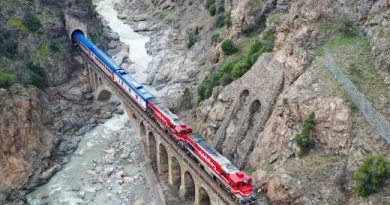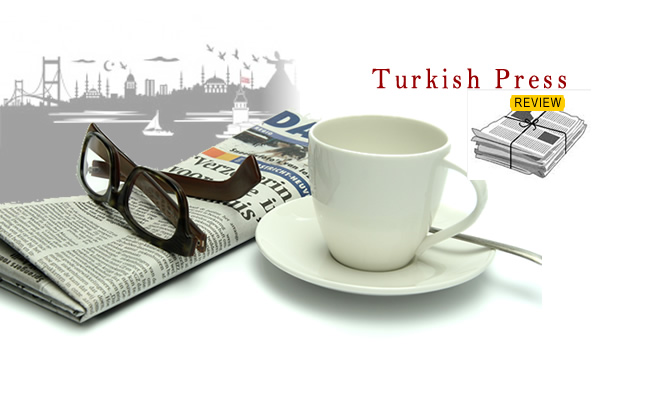News Scan, 25th Feb: President Gül says HSYK law violates 15 articles of Constitution
Gül says HSYK law violates 15 articles of Constitution
President Abdullah Gül has stated that his initial review of the newly passed controversial piece of legislation to restructure the Supreme Board of Judges and Prosecutors (HSYK) has found that the law violates 15 articles of the Constitution.
Gül signaled he would veto the HSYK legislation if Parliament does not adopt the required amendments to the law. “The latest draft [of the law] arrived three days ago, we’re still reviewing it,” Gül told a group of journalists at the Tarabya Presidential Campus in İstanbul on Sunday.
The law allows the undersecretary of the justice ministry to be elected chairman of the HSYK. In addition, the justice minister is further empowered in a number of ways in his interaction with the HSYK, such as having the authority to reshape the composition of all three chambers of the board and to initiate disciplinary procedures for HSYK members.
The planned changes to the HSYK come amid a heated debate over the future of a corruption and bribery investigation involving several members of the AK Party government. The sons of two former ministers are among 24 high-profile individuals, including a number of bureaucrats and businesspeople, who were arrested in mid-December on corruption and bribery charges as part of the investigation. Several of the suspects were released pending trial last week.
TODAYS ZAMAN
Reports of widespread wiretapping make waves in Ankara
Thousands of people, including Prime Minister Recep Tayyip Erdoğan, national intelligence chief Hakan Fidan and a wide range of journalists, academics, business leaders and NGO representatives, have been wiretapped for years by the police as part of different probes, Turkish media claimed Feb. 24. The reports prompted a top judicial body to open an internal investigation into the claims, but were dismissed by the prosecutor involved in the cases.
The classified files on the wiretappings were found in the Istanbul Public Prosecutor’s Office by the new prosecutors who were assigned following mass purges in the judiciary, pro-government dailies Star and Yeni Şafak claimed in separate but similar reports.
Yeni Şafak reported that up to 3,064 people have been wiretapped according to the first documents found by the newly appointed prosecutors, while Star alleged that the real number is likely close to 7,000.
HURRIYET DAILY NEWS
Prime Ministry says new tapes incriminating Erdoğan ‘montage,’ opposition demands resignation
A fresh wiretap leak late on Feb. 24 featuring four phone conversations between Prime Minister Recep Tayyip Erdoğan and his son on Dec. 17, 2013, when massive graft raids were conducted by police, has again sent shockwaves through Turkish politics, prompting separate emergency meetings in Ankara.
Erdoğan held a late night meeting with the head of the National Intelligence Organization (MİT), Hakan Fidan, over the latest tape incriminating him of corruption while the Prime Minister’s Office released a statement calling the tapes a “product of montage.”
The main opposition Republican People’s Party (CHP) gathered its Central Executive Board (MYK) as the news of the tapes spread through social media. The CHP’s deputy head, Gürsel Tekin, told daily Hürriyet following the meeting that the party believed that the phone conversation was not fake.
The four phone conversations are the latest in a series of leaked voice recordings of Erdoğan with businessmen and media representatives. The Hürriyet Daily News could not verify the authenticity of the recording uploaded onto YouTube and which received over 1.2 million hits in 12 hours.
HURRIYET DAILY NEWS
Another sensational scandal rocks Turkey
Since the Islamist Justice and Development Party (AKP) came to power over a decade ago, Prime Minister Recep Tayyip Erdogan has relentlessly argued that single-party government is what this country needs to assure political stability and economic welfare. This approach has been more or less accepted as a reference to a February 2001 incident where then-President Ahmet Necdet Sezer, at a National Security Council meeting, threw the booklet of the Constitution in the face of Bulent Ecevit, the head of the coalition government. That incident caused severe economic turbulence and led Turks to oust the mainstream political parties from powerhouse positions while giving the Erdogan government — which was new and untested — a chance to prove itself. Time, however, has shown that the threat to Turkey’s economic and political stability is not one-party or multiparty government — or the secular or Islamist camp — but rather a weak democratic system characterized by the absence of true checks and balances.
The latest example that makes this point appeared in the headlines this morning [Feb. 24] in the pro-government dailies Star and Yeni Safak. Since the corruption and bribery investigation became public in December, putting the Erdogan government under criminal scrutiny, Erdogan has been accusing the US-based Sunni religious leader Fethullah Gulen’s followers of hijacking the state’s key institutions, such as the judiciary and the security establishment, and forming a “parallel state” that aims to carry out a “coup” to bring down his government. Since the graft probe surfaced, the AKP government has reassigned hundreds of prosecutors and judges, and thousands of police officers, in a move unmatched in Turkey’s history.
Read more: http://www.al-monitor.com/pulse/originals/2014/02/another-turkish-scandal-wiretapping.html#ixzz2uKQ0NLu2
Turkey receives USD 12.7 billion FDI in 2013
Foreign direct investments (FDI) into Turkey stood at USD 12.686 billion in 2013, according to data released by the Ministry of Economy. Making up the total, the capital inflow topped USD 10.1 billion while real estate purchases by foreigners exceeded USD 3 billion. The overall amount experienced a drop of 4 percent when compared with 2012.
Accounting for 52 percent of the total, the EU remained Turkey’s principal source of foreign investment last year while, at the sector level, the country received USD 3.7 billion of cash inflow through financial intermediaries, followed by the USD 2.5 billion attracted by its booming energy sector.
Last year saw 2,960 company establishments by foreigners, taking the total number of foreign-owned or partnered companies to nearly 37,000. Germans constitute the largest group of foreign business owners in Turkey with over 5600 companies, followed by the British with 2600 companies as of the end of 2013. The majority of foreign-funded companies, nearly 22,000, are operating in Istanbul.
INVEST.GOV.TR
Mitsubishi Electric acquires Turkish Klima Plus
The electronics and electrical equipment manufacturing branch of Japanese Mitsubishi Group has announced the acquisition of Turkish company Klima Plus, its distributor for 10 years in the country.
The move aims at reinforcing the presence of Mitsubishi Electric in Turkey’s air conditioning market, where demand for inverter-type equipment has begun to rise since the introduction of new energy regulations early this year.
With high GDP growth rates and the third largest population in Europe, Turkey’s air conditioning market is expected to grow by 15 percent annually.
Daikin, another Japanese company active in the air conditioning business, acquired Turkish air conditioning company Airfer in 2011 to manufacture products in Turkey for the domestic as well as surrounding markets.
INVEST.GOV.TR
25.02.2014
This is a news-scan from major Turkish papers and internet sites. However, we do not verify above stories neither do we vouch for their accuracy.





